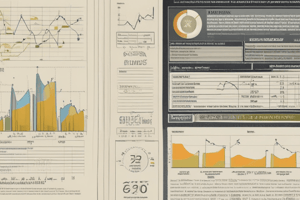Podcast
Questions and Answers
What is the primary purpose of a statement of financial performance?
What is the primary purpose of a statement of financial performance?
- To evaluate the success of a company’s operations over a specific period (correct)
- To measure the liquidity of a company
- To forecast future earnings
- To report on a company's asset management
Under ASPE, what is the term used for the statement of financial performance?
Under ASPE, what is the term used for the statement of financial performance?
- Statement of changes in equity
- Cash flow statement
- Balance sheet
- Income statement (correct)
Which components are included in the IFRS statement of comprehensive income?
Which components are included in the IFRS statement of comprehensive income?
- Liabilities, assets, and equity
- Net income, cash flow, and gains
- Net income and cash flows
- Revenues, expenses, net income, and OCI (correct)
How is Other Comprehensive Income (OCI) defined?
How is Other Comprehensive Income (OCI) defined?
What does comprehensive income equal?
What does comprehensive income equal?
What happens to Other Comprehensive Income at the end of the accounting period?
What happens to Other Comprehensive Income at the end of the accounting period?
Which of the following statements about the income statement under IFRS is true?
Which of the following statements about the income statement under IFRS is true?
What is a primary use of the income statement by investors and creditors?
What is a primary use of the income statement by investors and creditors?
Which of the following is a characteristic of high-quality earnings?
Which of the following is a characteristic of high-quality earnings?
What is meant by 'quality of earnings'?
What is meant by 'quality of earnings'?
Why might contingent gains not be reported in the income statement?
Why might contingent gains not be reported in the income statement?
What role does segregation of recurring income from nonrecurring income play?
What role does segregation of recurring income from nonrecurring income play?
What aspect does GAAP not always optimize in financial reporting?
What aspect does GAAP not always optimize in financial reporting?
What is a primary drawback of income measurement?
What is a primary drawback of income measurement?
Why is net income from continuing operations viewed as higher quality?
Why is net income from continuing operations viewed as higher quality?
What is one potential impact of using different accounting methods on the income statement?
What is one potential impact of using different accounting methods on the income statement?
What would be the most likely reason for separating discontinued operations on the statement of financial position?
What would be the most likely reason for separating discontinued operations on the statement of financial position?
In a single-step income statement, where is income tax reported?
In a single-step income statement, where is income tax reported?
What is a fundamental characteristic of revenues and expenses in comparison to gains and losses?
What is a fundamental characteristic of revenues and expenses in comparison to gains and losses?
What is one disadvantage of using a single-step income statement?
What is one disadvantage of using a single-step income statement?
Which of the following correctly describes the treatment of gains or losses in a single-step income statement?
Which of the following correctly describes the treatment of gains or losses in a single-step income statement?
What is the primary goal of earnings management?
What is the primary goal of earnings management?
Which of the following actions is NOT typically associated with earnings management?
Which of the following actions is NOT typically associated with earnings management?
What constitutes comprehensive income?
What constitutes comprehensive income?
What does OCI represent in financial statements?
What does OCI represent in financial statements?
Which measure best reflects ongoing business activities without irregular items?
Which measure best reflects ongoing business activities without irregular items?
Which of the following is an example of an irregular item that may impact income measures?
Which of the following is an example of an irregular item that may impact income measures?
What is a key impact of earnings management on reported financial results?
What is a key impact of earnings management on reported financial results?
How is net income calculated?
How is net income calculated?
Why might a company choose to decrease current-year earnings?
Why might a company choose to decrease current-year earnings?
What is a requirement for a component of an enterprise to be classified as discontinued operations?
What is a requirement for a component of an enterprise to be classified as discontinued operations?
Which of the following is NOT a criterion for assets to be classified as 'held for sale'?
Which of the following is NOT a criterion for assets to be classified as 'held for sale'?
How should assets held for sale be measured?
How should assets held for sale be measured?
What happens to depreciation on assets classified as held for sale?
What happens to depreciation on assets classified as held for sale?
Under IFRS, how are held for sale assets classified on the balance sheet?
Under IFRS, how are held for sale assets classified on the balance sheet?
Which of the following is a characteristic of discontinued operations?
Which of the following is a characteristic of discontinued operations?
What is required for a sale of an asset to be considered probable within a year?
What is required for a sale of an asset to be considered probable within a year?
In which of the following scenarios would assets be classified as held for sale?
In which of the following scenarios would assets be classified as held for sale?
If the value of an asset held for sale increases after it has been written down, how much gain can be recognized?
If the value of an asset held for sale increases after it has been written down, how much gain can be recognized?
Flashcards
Statement of Financial Performance
Statement of Financial Performance
A financial statement that reports on a company's financial performance over a specific period.
Income Statement
Income Statement
Under ASPE, this is a more traditional name for the Statement of Financial Performance.
Statement of Comprehensive Income
Statement of Comprehensive Income
Under IFRS, this refers to a statement that reports on a company's comprehensive income, including both net income and other comprehensive income.
Other Comprehensive Income (OCI)
Other Comprehensive Income (OCI)
Signup and view all the flashcards
Comprehensive Income
Comprehensive Income
Signup and view all the flashcards
Accumulated Other Comprehensive Income (AOCI)
Accumulated Other Comprehensive Income (AOCI)
Signup and view all the flashcards
OCI = Comprehensive Income - Net Income
OCI = Comprehensive Income - Net Income
Signup and view all the flashcards
Ordinary Activities
Ordinary Activities
Signup and view all the flashcards
Peripheral Activities
Peripheral Activities
Signup and view all the flashcards
Single-Step Income Statement
Single-Step Income Statement
Signup and view all the flashcards
Income/Loss from Discontinued Operations
Income/Loss from Discontinued Operations
Signup and view all the flashcards
Discontinued Operations in Notes
Discontinued Operations in Notes
Signup and view all the flashcards
Income statement and future prediction
Income statement and future prediction
Signup and view all the flashcards
Recurring vs. nonrecurring income
Recurring vs. nonrecurring income
Signup and view all the flashcards
Income statement limitations
Income statement limitations
Signup and view all the flashcards
Impact of accounting methods
Impact of accounting methods
Signup and view all the flashcards
Estimates in income measurement
Estimates in income measurement
Signup and view all the flashcards
Bias in financial reporting
Bias in financial reporting
Signup and view all the flashcards
GAAP's limitations
GAAP's limitations
Signup and view all the flashcards
Quality of earnings
Quality of earnings
Signup and view all the flashcards
Characteristics of high-quality earnings
Characteristics of high-quality earnings
Signup and view all the flashcards
Earnings Management
Earnings Management
Signup and view all the flashcards
Boosting Current-Year Earnings
Boosting Current-Year Earnings
Signup and view all the flashcards
Decreases Quality of Earnings
Decreases Quality of Earnings
Signup and view all the flashcards
Boosting Future-Year Earnings
Boosting Future-Year Earnings
Signup and view all the flashcards
Net Income
Net Income
Signup and view all the flashcards
Operating Income
Operating Income
Signup and view all the flashcards
OCI Calculation
OCI Calculation
Signup and view all the flashcards
Component of an enterprise
Component of an enterprise
Signup and view all the flashcards
Discontinued Operations
Discontinued Operations
Signup and view all the flashcards
Presentation of Discontinued Operations
Presentation of Discontinued Operations
Signup and view all the flashcards
Assets Held for Sale
Assets Held for Sale
Signup and view all the flashcards
Criteria for Held for Sale Assets
Criteria for Held for Sale Assets
Signup and view all the flashcards
Measurement of Held for Sale Assets
Measurement of Held for Sale Assets
Signup and view all the flashcards
Gain Recognition on Held for Sale Assets
Gain Recognition on Held for Sale Assets
Signup and view all the flashcards
Depreciation on Held for Sale Assets
Depreciation on Held for Sale Assets
Signup and view all the flashcards
Presentation of Held for Sale Assets on Balance Sheet
Presentation of Held for Sale Assets on Balance Sheet
Signup and view all the flashcards
IFRS Classification of Held for Sale Assets
IFRS Classification of Held for Sale Assets
Signup and view all the flashcards
Study Notes
Chapter 4: Reporting Financial Performance
- Harjot Mehmi teaches AFA300, Section 011
- Email: [email protected]
- Office: YDI 1066, 1 Dundas St W
- Office hours: Mondays, 1–3 PM
- Course week: September 30, 2024
In-Class Questions
- Solutions for in-class questions E4.16, P4.1, P4.2, P4.3, and P4.7 are posted on D2L.
- Solutions to textbook brief exercises are already available on D2L.
- Solutions to other textbook questions are not shared online.
- Students can get help with other questions by visiting the instructor during office hours.
Statement of Financial Performance
- Measures a company's operational success over a specific period.
- ASPE (Accounting Standards for Private Enterprises) refers to the income statement.
- IFRS (International Financial Reporting Standards) uses a statement of financial performance or separates profit/loss and comprehensive income statements.
- Statements of financial performance incorporate revenues, expenses, gains, losses, net income, and other comprehensive income.
- Statements of profit or loss include revenues, expenses, gains, and losses.
Other Comprehensive Income (OCI)
- Composed of unrealized gains/losses on securities, foreign exchange, and other gains/losses (IFRS-defined).
- OCI = Comprehensive Income – Net Income
- OCI is recorded as Accumulated Other Comprehensive Income (AOCI) on the statement of financial position (SFP).
Communicating Information About Performance
- The income statement is used for evaluating past performance and profitability, and for predicting future performance.
- Past success does not guarantee future success.
- Separating recurring income (continuing operations) from non-recurring income (e.g., discontinued operations) adds clarity.
- Results from continuing operations are more valuable for predicting future performance than those from discontinued operations.
Quality of Earnings/Information
- Income statements may omit items not reliably measured (e.g., contingent gains).
- Accounting methods (e.g., depreciation) and estimation (e.g., asset use) can impact reported figures.
- Financial reporting bias sometimes stems from financial pressures.
- Generally accepted accounting principles (GAAP) might not always be ideal.
Quality of Earnings
- How well reported earnings show the sustainability of earnings and business fundamentals without bias.
- Net income from continuing operations is considered more credible than net income from discontinued operations.
- High-quality earnings are unbiased, objectively determined, reflect economic reality, and relate to core activities and cash flow from operations.
- High-quality earnings are transparent and understandable.
Earnings Management
- Used to boost current earnings by reducing future earnings, or to decrease current earnings to boost future earnings.
- Results in lower quality (not sustainable and biased) earnings.
- Targeting earnings levels and then making adjustments to arrive at those targets requires thoughtful accounting policy choices (like slower asset depreciation).
- It involves using aggressive assumptions/estimates and unnecessary transactions to attain desired goals.
- Used by companies to satisfy investor expectations.
Types of Income
- Net income: Revenues less expenses (including gains and losses), excluding those under IFRS as OCI.
- Comprehensive income: Net income plus OCI.
- Operating income: Ongoing revenue less expenses, excluding irregular items like gains/losses, discontinued operations, or OCI.
Discontinued Operations
- Operations that have been sold, abandoned, or are formally planned for disposal.
- Component of an enterprise: part of an entity being disposed of.
- Distinction is made based on its cash flows and financial statements.
- It has its separate assets, liabilities, and cash flows, generating its own net cash flows.
- Usually comprises a major line of business or geographical area.
- It is displayed separately (net of tax) on the statement of financial performance and the statement of cash flows.
Assets Held for Sale
- If a business component hasn't yet been disposed of, it can still be classified as held for sale as part of discontinued operations if appropriate.
- Criteria for a component to be considered held for sale:
- A formal plan for its sale exists.
- Available for sale in its current state.
- An active search for a buyer.
- Probable sale within a year.
- Reasonably priced and actively marketed, with unlikely changes to the plan.
Assets Held for Sale: Measurement & Presentation
- If an asset's value increases after it has been written down, the gain can only be recognized up to the amount of the original loss.
- Depreciation is not applied to held-for-sale assets.
- Held-for-sale assets are presented separately in the balance sheet.
- Under ASPE, held-for-sale assets retain their original classification as current or non-current.
- Under IFRS, held-for-sale assets are usually classified as current.
Presentation of Discontinued Operations
- Income/loss from discontinued operations can be presented separately on the income statement or rolled into one single line, with more details provided in the notes.
- Separate presentation is important on the statement of financial position that showcases discontinued operations' assets.
Ordinary versus Peripheral Activities
- Revenues/expenses: everyday business activities
- Example: McDonald's burger sales.
- Gains/losses: infrequent or peripheral business activities
- Example: McDonald's deep fryer sales—gain if selling price exceeds book value.
Earnings Per Share (EPS)
- Key performance indicator.
- Measures dollars earned per common share (based on net income, not comprehensive income).
- Doesn't report dividend payments to shareholders.
- EPS = (Income available to common shareholders) / (Weighted average number of common shares outstanding).
EPS Presentation
- Public companies are required to include EPS on their income statements.
- Companies showing discontinued operations must report related EPS before and after such operations.
- EPS is typically less consequential for private companies whose shares are tightly held.
Statement of Retained Earnings (ASPE)
- Reconciles the retained earnings balance at the start and end of a reporting period.
- Net income/loss is recorded for the period.
- Accumulated income/loss and distributions to shareholders are explained.
- Retrospectively adjusts accounting policies and corrects errors.
- Changes in accounting estimates are reflected on the income statement and not in the retained earnings statement.
Statement of Changes in Equity (IFRS)
- Reconciles beginning/end balances of retained earnings, common shares, and other shareholders' equity accounts.
- Shows changes within each shareholders' equity account and changes to total shareholders' equity.
- Details the effects of retrospective reporting changes, comprehensive income, and OCI for each equity component.
- Includes OCI analysis details in the statement or notes.
Multiple-Step Income Statement
- Separates operating and non-operating transactions for each activity
- Aligns income/expenses with revenue sources.
- Shows intermediate steps like gross profit and operating income for better ratio analysis.
Single Step Income Statement
- Simplifies, presenting incomes and expenses collectively.
- Lists all incomes first, then expenses to get to net income/loss.
- Discontinued operations' income/loss is shown separately before tax.
- Only two categories: revenues/gains and expenses/losses
- Less detail than multiple-step statements, sacrificing some depth.
Studying That Suits You
Use AI to generate personalized quizzes and flashcards to suit your learning preferences.
Related Documents
Description
This quiz explores key concepts related to financial performance, income statements, and comprehensive income under accounting standards such as ASPE and IFRS. Test your knowledge on the components, definitions, and characteristics of financial reporting, as well as the implications of income measurement for stakeholders.




